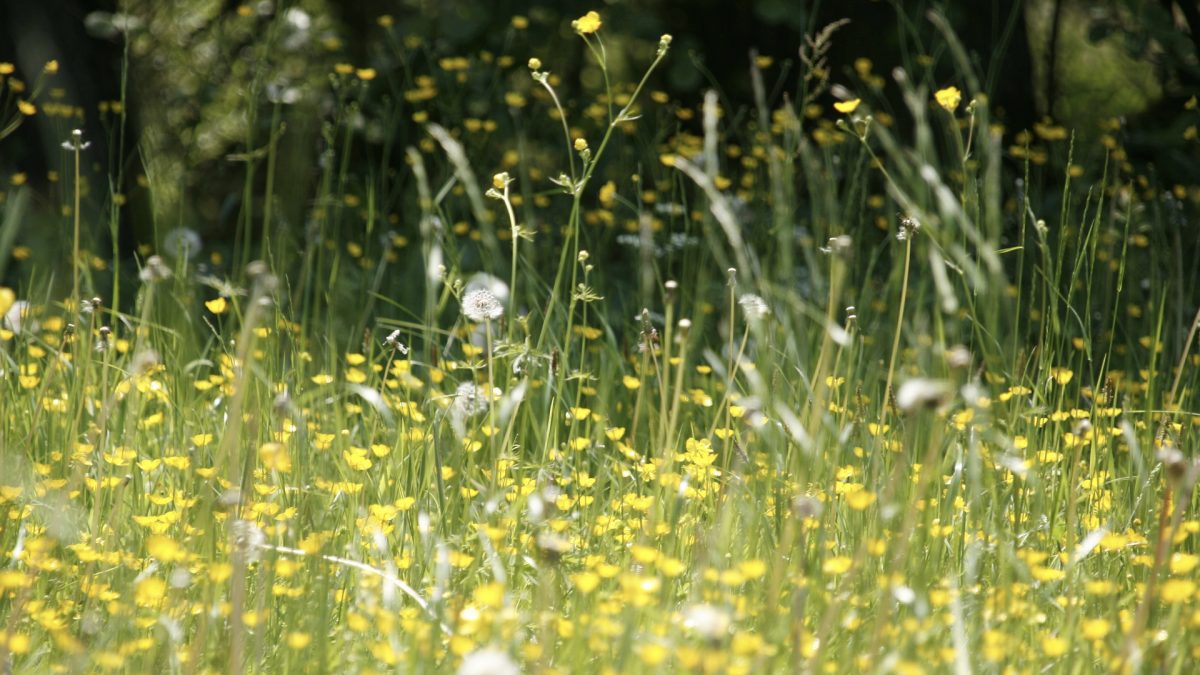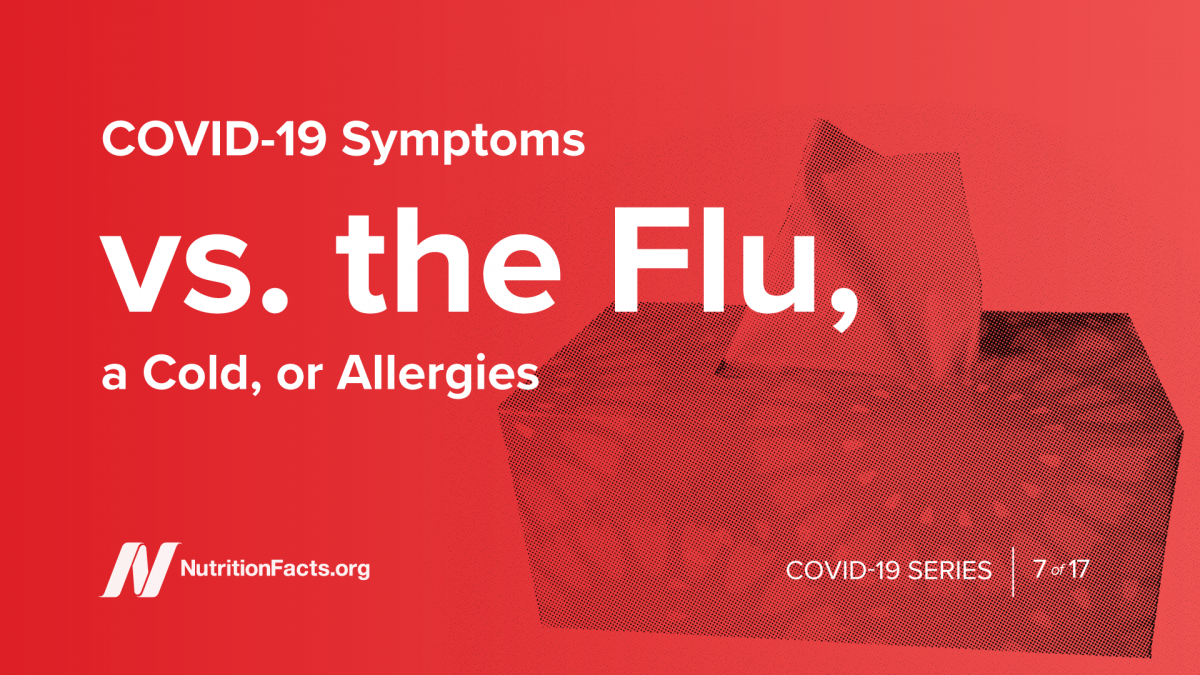
Allergies
Do you suffer from seasonal allergies? Runny nose, itchy eyes, sneezing? While your allergies may make you feel lousy because your immune system is busily attacking things left and right, that same heightened state of alertness may have benefits for your overall health.
Individuals suffering from allergies appear to have a decreased risk for certain cancers. Yes, your immune system might be in overdrive striking out a harmless things like pollen or dust, but that same overvigilance may also take down budding tumors in the body. It would be nice if there were a way to boost the part of the immune system that fights infections while down-regulating the part that results in chronic inflammation (and all those annoying symptoms).
Mushrooms—with their array of unique myconutrients that may boost our immune function—may just do the trick.
If mushrooms trigger such a dramatic rise in antibody production, shouldn’t we be concerned they may worsen the symptoms of allergic or autoimmune diseases? On the contrary, it seems mushrooms may have an anti-inflammatory effect. The first randomized, double-blind, placebo-controlled clinical study of its kind, published in 2014, confirmed an apparent anti-allergy effect in children with a history of recurrent upper-respiratory-tract infections.
Other whole plant foods may also impact our allergies—or lack thereof. Adolescents living in areas where more starchy foods, grains, vegetables, and nuts were consumed were significantly less likely to exhibit chronic symptoms of wheezing, allergic rhinoconjunctivitis, and allergic eczema, for example. Boys and girls eating two or more servings of vegetables a day appear to have only half the odds of suffering from allergic asthma. In general, the prevalence of asthma and respiratory symptoms reportedly appears to be lower among populations eating more foods of plant origin.
Those suffering from seasonal allergies may also benefit from drinking tea. Randomized trials have shown that drinking about three cups of Japanese Benifuuki green tea per day starting six to ten weeks before pollen season significantly reduces allergy symptoms. That’s nothing to sneeze at!
For substantiation of any statements of fact from the peer-reviewed medical literature, please see the associated videos below.
Image Credit: Iain Watson / Flickr. This image has been modified.
Popular Videos for Allergies


Preventing Allergies in Adulthood
The longest running study on vegetarians suggests that those eating plant-based diets have lower rates...
Preventing Childhood Allergies
What is responsible for the rising prevalence of atopic diseases, such as food allergies, asthma,...
COVID-19 Symptoms vs. the Flu, a Cold, or Allergies
What does the clinical course of COVID-19 look like for both those who survive and...All Videos for Allergies
-

Natural Ozempic Alternatives: Boosting GLP-1 with Diet and Lifestyle
Certain spices and the quinine in tonic water can boost GLP-1, but at what cost?
-

Is Ozempic (Semaglutide) Safe? Does It Increase Cancer Risk?
How common are serious potential side effects of GLP-1 weight-loss drugs, such as suicide, pancreatitis, bowel obstruction, thyroid cancer, and pancreatic cancer?
-

The Side Effects of Burning Incense
Burning incense has been found to generate about four times the particulate matter as burning cigarettes.
-

Are Onions Beneficial for Testosterone, Osteoporosis, Allergies, and Cancer?
What did randomized controlled human trials find about the ways we may—or may not—benefit from eating onions?
-

Does Intermittent Fasting Increase Human Life Expectancy?
Alternate-day modified fasting is put to the test for lifespan extension.
-

How to Treat Reflux in Children with Diet
Hypersensitivity reactions to dairy products even in those who test negative for cow’s milk allergy.
-

Best Food for Hay Fever (Seasonal Allergies)
What did a randomized, placebo-controlled, double-blind study of a food that costs pennies a day for ragweed allergy sufferers find?
-

Do Natural and DIY Tea Tree Oil Cleaning Products Disinfect as Well as Bleach?
What’s the best household cleaning product to use?
-

The Role of Dairy and Gluten in Canker Sores
Does excluding dairy products, food additives, and gluten-containing grains from one’s diet help those with recurring canker sores (aphthous ulcers)?
-

Best Foods to Avoid for Eczema
Randomized, double-blind, controlled trials suggest that excluding certain foods, such as eggs and chicken, can significantly improve atopic dermatitis.
-

The Effects of Too Much Arsenic in the Diet
Even at low-level exposure, arsenic is not just a class I carcinogen, but may also impair our immune function and increase our risk of cardiovascular disease and diabetes.
-

Best Food to Counter the Effects of Air Pollution
There is a food that offers the best of both worlds—significantly improving our ability to detox carcinogens like diesel fumes and decreasing inflammation in our airways—all while improving our respiratory defenses against infections.
-

How to Boost Your Immune System with Wakame Seaweed
Eating seaweed salad may boost the efficacy of vaccinations and help treat cold sores, herpes, Epstein-Barr virus, and shingles.
-

Is Obesity Infectious?
Given the role our gut bacteria can play in affecting our weight, having family and friends who are obese may not just be socially contagious, but actually contagious.
-

Does Bovine Insulin in Milk Trigger Type 1 Diabetes?
Is it the casein or the cow insulin that explains the link between milk consumption and the development of type I diabetes?
-

Who Shouldn’t Eat Soy?
How can soy foods have it both ways with pro-estrogenic effects in some organs that can protect bones and reduce hot flash symptoms, yet also anti-estrogenic effects in others that protect against breast and endometrial cancer?
-

Treating Infant Colic by Changing Mom’s Diet
Cow’s milk proteins can pass through breast milk—which may explain why maternal dairy-free diets are so effective in treating infant colic.
-

Anti-Inflammatory Diet for Depression
If depression can be induced with pro-inflammatory drugs, might an anti-inflammatory diet be effective in preventing and treating mood disorders?
-

Laughter as Medicine
What effects do laughing, crying, kissing, cuddling, and sex have on immune function and allergic responses?
-

Kiwifruit for the Common Cold
Compared to bananas, does eating kiwifruit decrease the incidence and severity of upper respiratory tract infections?
-

Music as Medicine
Music can beat out anti-anxiety drugs, Mozart can reduce allergic reactions, and how listening to your favorite tunes can significantly affect your testosterone levels.
-

Inhibiting Platelet Activation with Tomato Seeds
The yellow fluid around tomato seeds appears to suppress platelet activation without affecting blood clotting. This anti-inflammatory effect may explain why eating tomato products is associated with lower cardiac mortality.
-

How to Diagnose Gluten Intolerance
After a formal evaluation to rule out celiac disease, those who suspect they might have gluten sensitivity should first try improving their diet and then have other causes excluded before going on a gluten-free diet, since as many as 1 in 3 people who avoid gluten for symptom control end up having a different disease altogether.
-

Gluten-Free Diets: Separating the Wheat from the Chat
How common is gluten sensitivity? Are there benefits of gluten? Why does the medical profession explicitly advise against people who suspect they might be gluten intolerant from just going on a gluten-free diet?
-

Is Gluten Sensitivity Real?
For more than 30 years, the medical profession has debated the existence of an intolerance to the wheat protein, gluten, unrelated to allergy or celiac disease. What is the evidence pro and con?
-

Childhood Constipation and Cow’s Milk
The elimination of all dairy products was found to cure constipation in up to 100% of kids tested, leading to a resolution of rectal inflammation and complications such as anal fissures.
-

Inhibiting Platelet Aggregation with Berries
The number one killer of Americans may be not eating enough fruit. Even if we just met the recommendations for fruit and vegetable intake we could save more than 100,000 people a year. One of the mechanisms by which plant foods protect us is by keeping our platelets from becoming activated.
-

Tick Bites, Meat Allergies, and Chronic Urticaria
The rising incidence of tick-bite induced meat allergies may account for cases of previously unexplained (“idiopathic”) persistent hives among children.
-

Alpha-Gal and the Lone Star Tick
Our immune response against a foreign molecule present in animal products may play a role in some allergic, autoimmune, and inflammatory disorders. This reaction is thought to underlie tick bite-triggered meat allergies.
-

Walnuts and Artery Function
Not eating walnuts may double our risk of dying from heart disease (compared to at least one serving a week)—perhaps because nuts appear to improve endothelial function, allowing our arteries to better relax normally.
-

Treating Asthma with Plants vs. Supplements?
Whole fruits and vegetables were compared to both antioxidant pills, as well as supplements containing fruits and vegetable extracts, for their ability to treat seasonal allergies, improve lung function, and control asthma.
-

Treating Asthma with Fruits and Vegetables
Increasing fruit and vegetable consumption to seven servings a day appears to cut asthma exacerbation rates in half, whereas restricting consumption to Standard American Diet levels leads to a significant worsening of lung function and asthma control.
-

Preventing Asthma with Fruits and Vegetables
A study involving more than a million kids suggests the striking worldwide variation in childhood rates of allergies, asthma, and eczema is related to diet.
-

Dietary Sources of Alkylphenol Endocrine Disruptors
Foods of animal origin (especially fish) appear to be the most important source of human exposure to industrial pollutants such as alkylphenol xenoestrogens.
-

Alkylphenol Endocrine Disruptors and Allergies
The dramatic rise of allergic diseases such as eczema and seasonal allergies may be related to dietary exposure to endocrine-disruptor xenoestrogens, such as alkylphenol industrial pollutants.
-

Preventing the Common Cold with Probiotics?
Though prebiotics may be preferable, probiotics may reduce the risk of upper respiratory tract infections.
-

Boosting Immunity While Reducing Inflammation
Cooked white mushroom consumption stimulates antibody production, while potentially still playing an anti-inflammatory role.
-

Uprooting the Leading Causes of Death
Death in America is largely a foodborne illness. Focusing on studies published just over the last year in peer-reviewed scientific medical journals, Dr. Greger offers practical advice on how best to feed ourselves and our families to prevent, treat, and even reverse many of the top 15 killers in the United States.
-

Cow’s Milk Casomorphin and Autism
Opiate-like casomorphins liberated from the cow’s milk protein, casein, are accused of participating in the cause of such conditions as autism, crib death, type I diabetes, postpartum psychosis, circulatory disorders, and food allergies.
-

Throw Household Products off the Scent
Volatile chemicals in consumer products such as air fresheners, laundry detergents, fabric softeners, and dryer sheets may be hazardous.
